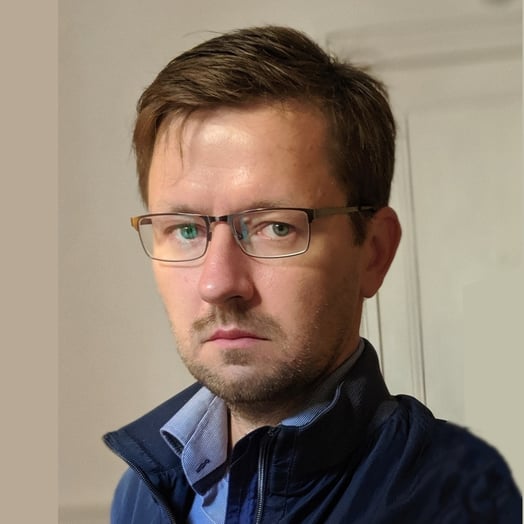
Konstantin Kanishchev
Verified Expert in Engineering
Full-stack Developer
Konstantin is a full-stack software developer with a background in theoretical physics. He is an expert in modern C++, Python, and JavaScript. He is also an expert in functional the following programming languages: OCaml, Haskell, and ReasonML. He has deep experience in research-level software development, machine learning, big data analysis, and data visualization. Konstantin has high-level expertise in statistics, CS, and applied mathematics.
Portfolio
Experience
Availability
Preferred Environment
Git, Linux, C++17, Python
The most amazing...
...thing I've built is a LLVM Kaleidoscope language tutorial that's adapted for Boost Spirit, a C++ library used to develop parsers for text formats.
Work Experience
CEO
Univalence Consulting
- Designed and deployed a back end for performant data retrieval and tokenization of NLP tasks. Further developed it into a full-stack web and mobile application.
- Developed a specialized LLM sampling algorithm for specific data retrieval tasks together with a corresponding fine-tuned language model. Deployed it for large scale data processing (millions of records per day).
- Managed a small R&D team in the area of LLM product research, focusing on performance optimization and reliability of the LLM responses.
Research Fellow
CERN (AMS collaboration)
- Participated in the development and maintenance of the data processing pipeline for the cosmic ray detector on the International Space Station.
- Developed a MCMC statistical toolbox for analysis of science data.
- Deployed a RabbitMQ cluster on OpenStack for monitoring the calibration status of a detector.
- Had a Data Lead position in the Payload Operations and Control Center.
- Worked on a worldwide international collaboration, joining CERN and NASA efforts on the most complex particle physics detector in space.
Graduate Student
CERN (CMS collaboration)
- Developed and deployed algorithms for data analysis at the Compact Muon Solenoid experiment at the Large Hadron Collider.
- Worked on software for heavy data analysis with Worldwide LHC Computing Grid. Developed a GRID job-management software dedicated for a particular CPU-critical task.
- Collaborated on the application and the machine-learning algorithms for event selection and improvement of the sensitivity of the particle physics experiment.
- Was heavily involved in statistical analysis of the retrieved experimental data.
- Worked in a large (about 4,000 personnel) international and rapidly changing collaborative environment doing leading-edge fundamental research.
System Administrator
Institute of Mathematics SB RAS
- Created and supported a small network of about 10 Windows desktops and a Linux server used as a computing workstation.
- Created a simple Bash-script-based job management system.
- Worked on cross-compilation and interoperability of legacy code, written in C, C++, Fortran, and OCaml.
Instructor
Novosibirsk State University
- Taught courses in: C++ and MFC, Object Oriented Programming and Design, Numerical methods, and Symbolic Calculation with Wolfram Mathematica.
- Active in more Physics related courses as well, such as classical and quantum mechanics, statistics, and cosmology.
Intern
Novosoft
- Worked in a small team of software developers.
- Designed and worked on the implementation of software for testing of video codecs.
- Implemented a library for reading various image and video file formats. Due to the absence of documentation, this sometimes required reverse-engineering of the files.
Experience
2HDM explorer
MPM Flexible Body Simulation
http://physics.stackexchange.com/questions/629/why-does-one-experience-a-short-pull-in-the-wrong-direction-when-a-vehicle-stops/6107#6107LLVM Kaleidoscope tutorial in Boost::Spirit
https://github.com/KKostya/SpiritKaleidoscopeRealtime Joukowski map in JavaScript.
http://bl.ocks.org/KKostya/6066548Skills
Languages
JavaScript, OCaml, C++, Fortran, Python, Bash Script, XML, C++17
Frameworks
Boost, Flask, Flex, Ruby on Rails 4
Libraries/APIs
Standard Template Library (STL), D3.js, Node.js, Vue, React, WinAPI, Microsoft Foundation Class (MFC) Library, jQuery, Microsoft Foundation Classes (MFC)
Paradigms
Object-oriented Programming (OOP), Functional Programming, Template Metaprogramming, Data Science
Other
Software Development, Physics Simulations, Big Data Architecture, Physics, Artificial Neural Networks (ANN), Full-stack, FastAPI, Natural Language Processing (NLP), GPT, COM, Deep Neural Networks, Generative Pre-trained Transformers (GPT), Large Language Models (LLMs), Artificial Intelligence (AI)
Platforms
Linux, OpenStack
Tools
Git
Education
Ph.D. in Theoretical Particle Physics
University of Trento - Trento, Italy
Master's Degree in Physics
Novosibirsk State University - Novosibirsk, Russia
Bachelor's Degree in Computer Science
Novosibirsk State University - Novosibirsk, Russia
Certifications
Natural Language Processing Specialization
Coursera
How to Work with Toptal
Toptal matches you directly with global industry experts from our network in hours—not weeks or months.
Share your needs
Choose your talent
Start your risk-free talent trial
Top talent is in high demand.
Start hiring